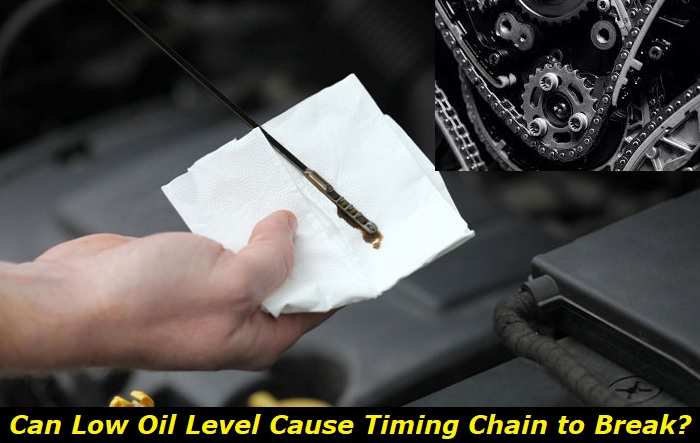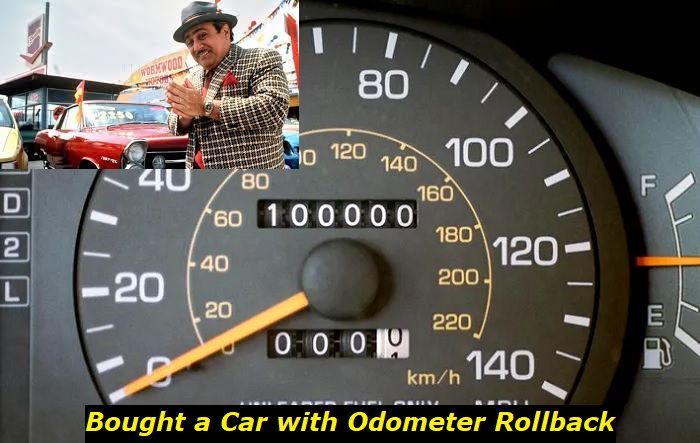Low oil levels and pressure can cause problems with the timing chain affecting the chain itself and the tensioner. The chain should be lubricated to live a long and happy life. Exactly because the chain is lubricated with oil, the majority of manufacturers state that it should live as long as the entire engine. But things may not be that good.
Oil level problems highlights
- Level of urgency:medium
- Average mileage:not related to mileage
- Repair cost:$5 - $550
- DIY repair:yesbutmaybe complicated
- Commonreasons:overfilled oil, coolant leaking into oil, gas leaking into oil
- If ignored:fatal engine damage, catalytic converter damage
- How to solve:add oil or pump it outdependingon the nature of the problem

Oil and timing chain - how are they connected?
Previously, almost all engines were equipped with timing belts. Those were not lubricated, in most cases, and didn't come in contact with oil at all. But they couldn't live longer than 60,000 miles, on average, so car owners had to replace the entire kit (the belt, pulley, water pump, and tensioner) quite often.
Later, more and more engines started using the timing chain. This is the metal chain that drives the camshafts and the crank. It does the same job as the timing belt in other engines. Also, this chain has a tensioner that allows it to work even if it's a little stretched.
Here's how oil interacts with the chain:
- most timing chain systems are submerged in oil, so the oil always lubricates the chain;
- the lubrication doesn't allow the chain to get damaged when running through the sprockets on the shafts;
- also, the oil helps avoid overheating in the chain and sprockets making its work calmer and less stressful;
- tensioner gets lubricated, too, and without proper lubrication it may get stuck and the chain will eventually get damaged;
- without lubrication, the chain will still work, but it will get much more stress in the process;
- in different engines, the system of chain lubrication may be different, so it may be the oil level or oil pressure that makes it suffer;
- also, if the chain is not lubricated, there are problems with the oil system at all and the engine is at high risk.
The majority of chains rest in an oil bath. It means that the lower part is always in the oil and it gets lubricated passively when you drive your vehicle. But when the oil level is very low, much lower than the MIN mark on the dipstick, the chain doesn't get lubricated, and all the remains of oil are sent to the most vulnerable parts of the engine. And this may affect the work of the timing system.
I should also say that when the engine chain is not getting lubricated, a lot of other mechanisms suffer, too. There is a high risk of the engine getting stuck or wearing heavily for a short period of time.
Will the timing chain break if it's not lubricated?
When the engine level is low and the timing chain is not lubricated properly, it will not break at once. But after some time, if the problem is ignored, the chain will stretch fatally and eventually fail. In most cases, it will not break but jump one or two teeth. But that's enough to kill or seriously damage a modern engine.
So, the low oil level can be the reason for timing chain breaking but, in the majority of situations, it will stretch the chain. Even if you add oil after that, the chain will not get back to its normal condition. So, if you have extremely low oil levels in your engine, you should have the timing system inspected by a professional mechanic.
Usually, the broken chain is the result of some other issues or complex problems in the engine. If the low oil pressure or level affects the chain, this happens gradually. The most important thing, in this case, is to notice that the engine is rattling. If you notice this rattle, you can easily prevent the timing chain from failing.
What else can kill the timing chain in your engine?
The low level of oil in the engine is not the most common problem that may kill the chain. It can obviously die because of other reasons. And those reasons are much more common than fatally low oil levels.
Unfortunately, the chain may be affected by almost any serious engine problem. Especially, if you take the modern chains that are extremely thin and non-reliable.
So, here are the issues that can kill the chain in your engine:
1) Overheating
Although this often comes from poor lubrication, the overheating may also be the result of other issues like poor engine cooling. If the chain overheats, it can lose its properties, the metal will become weaker after some time and the chain may just fall apart.
2) Poor tension
After some time of work, timing chains tend to stretch. There is a tensioner that compensates for this stretching. But the tensioner has a limited opportunity to hold the tension of the chain. If it stretches more than expected, the chain will become loose and will jump or break eventually.
3) The engine gets stuck
If the engine gets stuck unexpectedly when you are driving at a high speed, there is a high chance of the chain breaking. Especially, if one of the camshafts gets stuck while the crank keeps rotating using the inertia power. This will most likely tear the chain.
4) Ageing chain
Metal has a certain age of proper service. The metal that is used for the timing chain should be OK for about 10 years. After that, it's better to replace the chain with a new one even if you don't have any symptoms of a bad chain in your vehicle.
Usually, the chain may break if it's old just because the metal is exhausted and can't hold the needed load. Also, the entire chain kit should be replaced, too.
5) Stuck sprocket
Timing belts run on pulleys while chains use sprockets for this. The sprockets are on the shafts, tensioner, and also the water pump (if it's driven by the chain). If one of these sprockets suddenly gets stuck, you may find your chain broken to pieces. Especially, if this happens at high speed when the engine is revving like crazy.
6) Mileage
Although cat manufacturers often state that the timing chain is there to live forever, it's not true. It will only live about 100,000 miles or 120,000 miles and then will start stretching rapidly till it jumps or breaks. It's recommended to replace the timing chain kit at least once every 120,000 miles or 10 years whichever comes first.
7) Poor quality parts
It's very important to install the OEM timing chain. Most engines will require timing chain replacement once during their lives. And it just doesn't make sense to try and save some money buying the aftermarket chain and tensioner. Spend a couple of dollars more and get the OEM part. Also, have it installed by a professional mechanic to avoid installation mistakes.
Symptoms of soon timing chain death
Whatever causes timing chain problems, you should remember the symptoms that are telling you that something is wrong with the chain. This will help you identify the problem before it kills your engine.
If the chain breaks or jumps, the engine is very often dead because of severe damage to valves and pistons. So, remember the following symptoms and have the chain checked immediately if you spot them in your car.
Here they are:
- rattling engine - this means that the chain is most likely stretched and requires replacement as soon as possible;
- harsh work - the stretched chain will change the timing a little, so the valves will open at the wrong time and this will make the entire engine work harshly;
- loss of power - this is the last stage before the chain breaks, the timing is changed dramatically and now the engine misfires losing power and even throwing the P0300 code;
- very hard start - given the timing is changed, the engine is extremely hard to start, it may crank for a long time without actually starting.
Unfortunately, a lot of affected chains will show no symptoms at all before they break. So if you spot these symptoms, you should act immediately. Don't keep driving your car and waiting till you find some free time to make an appointment with the repair shop. Just go directly to the shop and have the problem fixed.
Also, if you find out that the engine oil in your engine is on an extremely low level, top up the oil and go to the shop to have the timing chain checked. It may have been affected by this issue.
About the authors
The CarAraC research team is composed of seasoned auto mechanics and automotive industry professionals, including individuals with advanced degrees and certifications in their field. Our team members boast prestigious credentials, reflecting their extensive knowledge and skills. These qualifications include: IMI: Institute of the Motor Industry, ASE-Certified Master Automobile Technicians; Coventry University, Graduate of MA in Automotive Journalism; Politecnico di Torino, Italy, MS Automotive Engineering; Ss. Cyril and Methodius University in Skopje, Mechanical University in Skopje; TOC Automotive College; DHA Suffa University, Department of Mechanical Engineering






Add comment